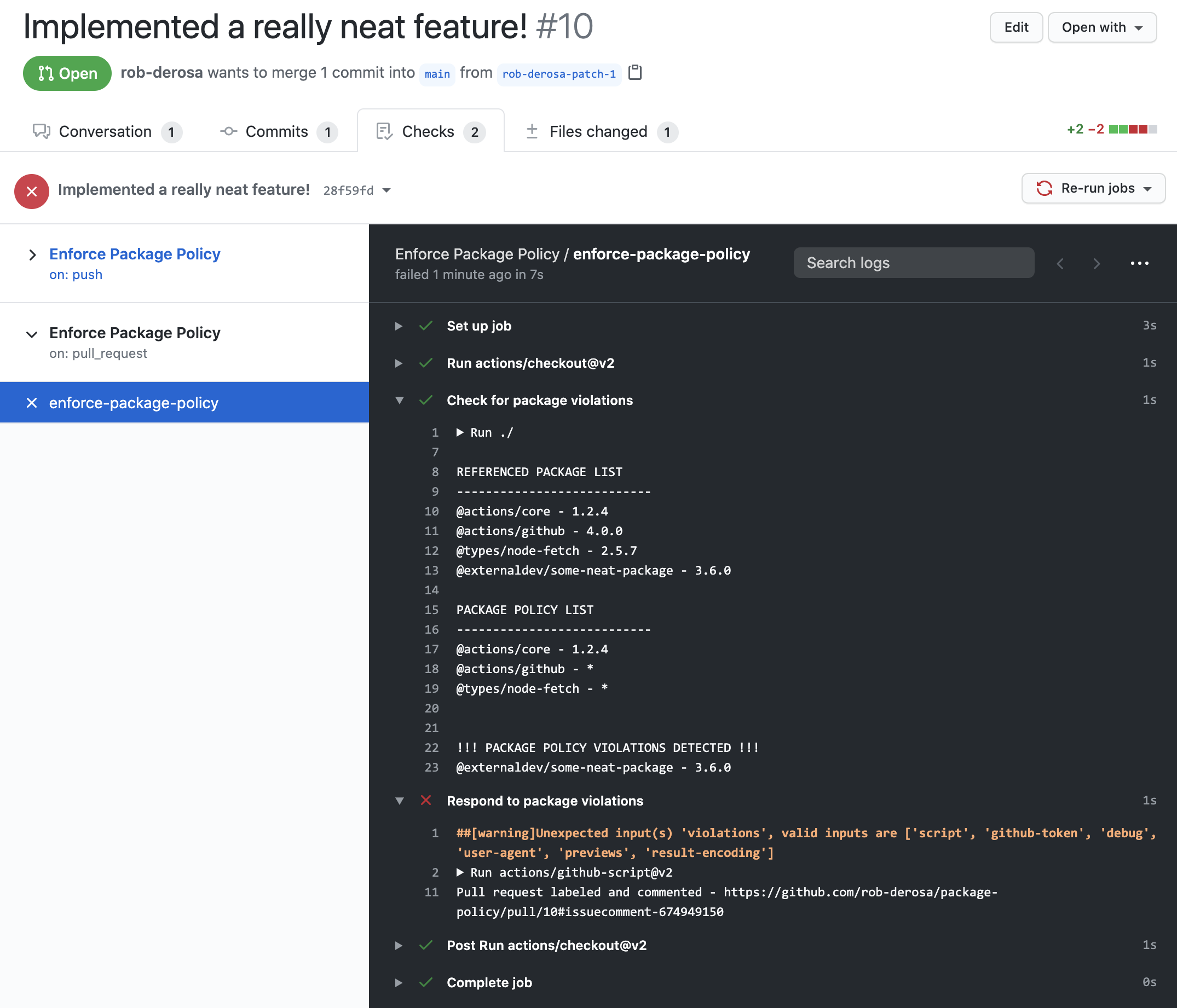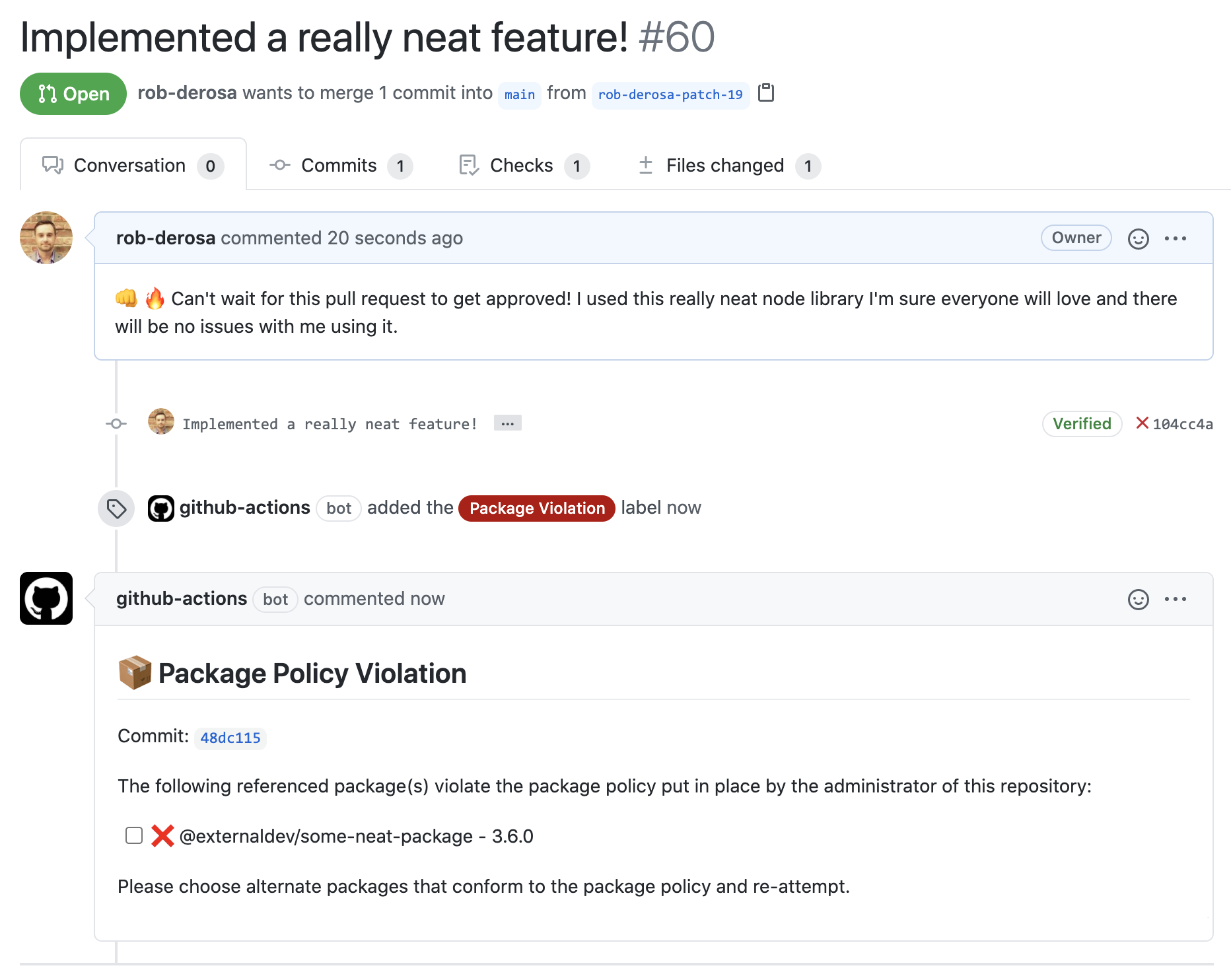This GitHub action allows you to provide a list of packages allowed or prohibited along with versions to be enforced within this repository. If a code push or pull request contains changes to a package.json manifest file containing a reference to a package that violates the package policy, a violations output value is set containing an array of the offending packages in JSON format.
Why enforce dependencies?
- internal security analysis by SecOps
- licensing restrictions
- centralization around standard libraries
Versions can be specified as:
- literal -
1.2.5 - any version -
* - specific to major and/or minor -
1.2.*
🛀 Versions are sanitized of any non-numeric characters (^, ~, v) before comparison
Create a .github/workflows/enforce-package-policy.yml file:
name: "Enforce Package Policy"
on:
push:
pull_request:
types:
- opened
- edited
jobs:
enforce-package-policy:
runs-on: ubuntu-latest
steps:
- uses: actions/checkout@v2
- uses: rob-derosa/package-policy@v1
name: "Check for package violations"
id: package-policy
with:
policy: allow
policy-url: "https://mycompanywebsite.com/security/allow_policy.json"
fail-if-violations: false
github-token: ${{ secrets.GITHUB_TOKEN }}
- uses: actions/github-script@v2
name: "Respond to package violations"
with:
github-token: ${{secrets.GITHUB_TOKEN}}
violations: ${{steps.package-policy.outputs.violations}}
script: |
const script = require(`${process.env.GITHUB_WORKSPACE}/.github/workflows/package_violation.js`)
await script({github, context, core}){
"applicationinsights": "1.0.8",
"chokidar": "*",
"graceful-fs": "*",
"http-proxy-agent": "^2.1.*",
"https-proxy-agent": "^2.*",
"iconv-lite-umd": "~0.6.8",
"jschardet": "*",
"keytar": "*",
"minimist": "^1.2.5",
"native-is-elevated": "0.4.x",
"native-keymap": "2.1.2",
"native-watchdog": "1.3.*"
}The following inputs are accepted:
policy: Provide eitherallowto treat the policy as an allow list orprohibitto treat it as a prohibit listpolicy-url: The remote URL of the policy.json file containing a list of packages and versions allowed or prohibited (see sample payload)fail-if-violations: set to false if you want this action to refrain from setting the status of this action to fail - this allows downstream actions to rungithub-token: leave this be 🤘 - needed to access the added or modified files
Note that this action only checks to see if package violations are detected and writes that data to the violations output. In this sample,
we use a downstream action to respond to any violations that occur. By using the actions/github-script@v2 action, we can execute
Javascript directly in the yaml workflow. Even cleaner, we can consolidate that logic in it's own file and call it from the yaml workflow.
steps:
...
- uses: actions/github-script@v2
name: "Respond to package violations"
with:
github-token: ${{secrets.GITHUB_TOKEN}}
violations: ${{steps.package-policy.outputs.violations}}
script: |
const script = require(`${process.env.GITHUB_WORKSPACE}/.github/workflows/package_violation.js`)
await script({github, context, core})Here we are executing logic contained in the .github/workflows/package_violation.js file. If a a violation occurs:
- triggered by code push
- an issue will be created, labeled with
Package Violation, containing a link to the commit, and assigned to the user pushing the code
- an issue will be created, labeled with
- triggered by pull request being opened or updated
- the pull request will be labeled with
Package Violationand a comment is added with violation details
- the pull request will be labeled with
Keeping the response to the violations in a separate step and that logic in a Javascript file allows for maximum flexibility on how you choose to respond while still providing access to context, core, octokit and io.
A commit was made that included an update to the package.json manifest file.

Because a violation was detected, a comment is added to the pull request and labeled. If triggered by a code push, a new issue is created and assigned to the user who pushed the code.

- supports Javascript and Typescript projects currently
- provide support for other frameworks (.NET, Ruby, Java, Go)
- provide support for ignore path filters to allow ignoring specific package manifest files (i.e. backups)
MIT